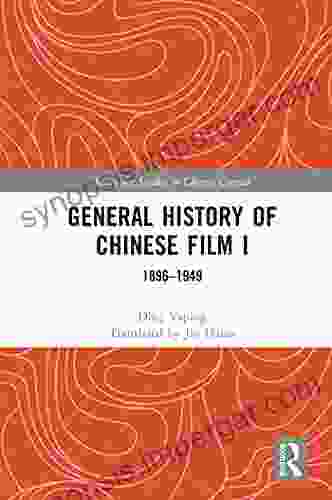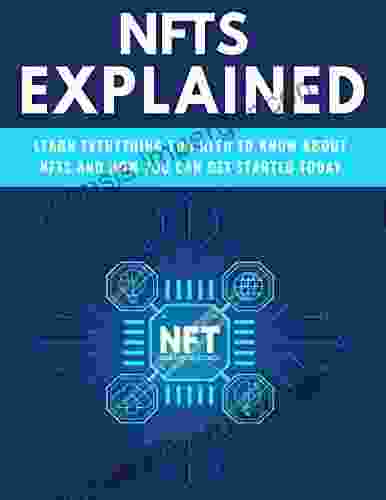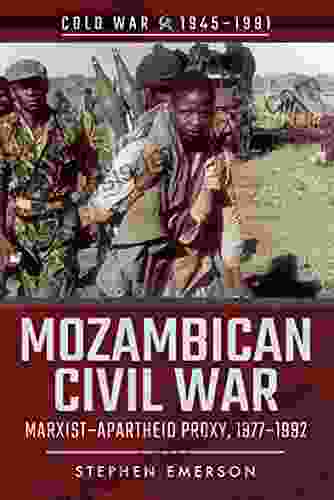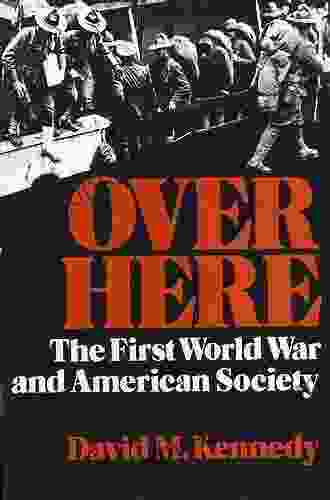Mozambican Civil War: A Proxy Conflict in the Shadow of Apartheid and the Cold War (1977-1992)

The Mozambican Civil War, a protracted and devastating conflict that engulfed the country from 1977 to 1992, was a complex proxy war deeply intertwined with the broader struggles of apartheid, communism, and the Cold War. This article aims to shed light on the historical background, major players, and international implications of this brutal war.
4.6 out of 5
| Language | : | English |
| File size | : | 8717 KB |
| Text-to-Speech | : | Enabled |
| Screen Reader | : | Supported |
| Enhanced typesetting | : | Enabled |
| Word Wise | : | Enabled |
| Print length | : | 133 pages |
| Lending | : | Enabled |
Historical Background
Mozambique, a former Portuguese colony, gained independence in 1975 after a protracted liberation war against the colonial regime. The newly independent Mozambique was led by the Marxist-leaning Front for the Liberation of Mozambique (FRELIMO),which established a one-party state and pursued socialist policies.
However, FRELIMO's rule was met with resistance from various factions, including the Mozambique National Resistance (RENAMO). RENAMO was formed in 1976 by former FRELIMO members who opposed the government's authoritarianism and socialist ideology. Initially supported by Rhodesia (now Zimbabwe),which feared the spread of communism in the region, RENAMO also received covert backing from South Africa, which sought to maintain its apartheid system by destabilizing neighboring countries.
Major Players
The Mozambican Civil War was fought between two main factions:
- FRELIMO, the ruling party, led by President Samora Machel, was supported by the Soviet Union and other socialist countries.
- RENAMO, the rebel group, led by Afonso Dhlakama, was backed by South Africa, Rhodesia, and the United States.
The conflict also involved other actors, including neighboring Zimbabwe, which supported FRELIMO, and Malawi, which provided sanctuary to RENAMO rebels.
International Implications
The Mozambican Civil War became a major proxy conflict during the Cold War. The Soviet Union and its allies supported FRELIMO as a bulwark against Western influence in the region, while the United States and its allies backed RENAMO to counter Soviet expansionism.
The war also had significant regional implications. RENAMO's attacks on civilian targets and infrastructure destabilized Mozambique and neighboring countries, creating a humanitarian crisis and fueling economic decline. The conflict also hindered regional cooperation and development efforts.
Aftermath and Impact
The Mozambican Civil War ended in 1992 with the signing of the Rome General Peace Accords. The peace process was mediated by the United Nations and involved extensive international negotiation. The accords provided for a ceasefire, the disarmament of both sides, and the establishment of a multi-party democracy.
The war had a devastating impact on Mozambique. An estimated 1 million people were killed, and millions more were displaced or injured. The country's infrastructure was severely damaged, and its economy was shattered. The war also left deep social and psychological scars on the Mozambican population.
The Mozambican Civil War was a complex and tragic conflict that reflected the broader ideological and political struggles of the Cold War era. The war had a profound impact on Mozambique, its neighbors, and the international community. The legacy of the war continues to shape Mozambican society and politics today.
Understanding the history and causes of the Mozambican Civil War is crucial for appreciating the challenges and complexities of post-colonial Africa. It is a reminder of the devastating consequences of proxy wars and the importance of peaceful conflict resolution.
4.6 out of 5
| Language | : | English |
| File size | : | 8717 KB |
| Text-to-Speech | : | Enabled |
| Screen Reader | : | Supported |
| Enhanced typesetting | : | Enabled |
| Word Wise | : | Enabled |
| Print length | : | 133 pages |
| Lending | : | Enabled |
Do you want to contribute by writing guest posts on this blog?
Please contact us and send us a resume of previous articles that you have written.
 Book
Book Novel
Novel Page
Page Chapter
Chapter Text
Text Story
Story Genre
Genre Reader
Reader Library
Library Paperback
Paperback E-book
E-book Magazine
Magazine Newspaper
Newspaper Paragraph
Paragraph Sentence
Sentence Bookmark
Bookmark Shelf
Shelf Glossary
Glossary Bibliography
Bibliography Foreword
Foreword Preface
Preface Synopsis
Synopsis Annotation
Annotation Footnote
Footnote Manuscript
Manuscript Scroll
Scroll Codex
Codex Tome
Tome Bestseller
Bestseller Classics
Classics Library card
Library card Narrative
Narrative Biography
Biography Autobiography
Autobiography Memoir
Memoir Reference
Reference Encyclopedia
Encyclopedia Patricia Howlin
Patricia Howlin Diane Michaels
Diane Michaels Diane Pecknold
Diane Pecknold Denise Jolley
Denise Jolley David Rollins
David Rollins David R Boyd
David R Boyd Martin Davies
Martin Davies John Stretch
John Stretch Diana Henderson
Diana Henderson Dean Calusdian
Dean Calusdian David T Zabecki
David T Zabecki Deborah Antai Otong
Deborah Antai Otong Deedee Filiatreault
Deedee Filiatreault Philip Toshio Sudo
Philip Toshio Sudo David Mackenzie
David Mackenzie Joanne Fedler
Joanne Fedler David Smerdon
David Smerdon David T Levinson
David T Levinson Deborah J Bennett
Deborah J Bennett Deborah Canja
Deborah Canja
Light bulbAdvertise smarter! Our strategic ad space ensures maximum exposure. Reserve your spot today!

 Haruki MurakamiLaw, Security, and the State of Perpetual Emergency: Unraveling the Threads...
Haruki MurakamiLaw, Security, and the State of Perpetual Emergency: Unraveling the Threads... Aleksandr PushkinFollow ·16.1k
Aleksandr PushkinFollow ·16.1k Sammy PowellFollow ·14.3k
Sammy PowellFollow ·14.3k Devin RossFollow ·6.7k
Devin RossFollow ·6.7k Andy HayesFollow ·16.2k
Andy HayesFollow ·16.2k Mikhail BulgakovFollow ·15.3k
Mikhail BulgakovFollow ·15.3k Bruce SnyderFollow ·3.9k
Bruce SnyderFollow ·3.9k Sidney CoxFollow ·14.5k
Sidney CoxFollow ·14.5k Jessie CoxFollow ·16.8k
Jessie CoxFollow ·16.8k

 Ivan Turgenev
Ivan Turgenev38 Art Made During The Pandemic Digitally Enhanced Art...
By [Author's Name] The year 2024 was a time...

 F. Scott Fitzgerald
F. Scott FitzgeraldAmazing Cooking Guide To South Beach Diet: Your Culinary...
Embark on a...

 Zachary Cox
Zachary CoxGeneral History of Chinese Film: A Journey Through Time...
Origins and...

 Cristian Cox
Cristian CoxUnderstanding Antidepressants: An In-Depth Guide to...
Unleashing the Power of...

 Jeremy Cook
Jeremy CookUnlock the NFT Revolution: A Comprehensive Guide for...
The world of Non-Fungible Tokens (NFTs) has...

 Kevin Turner
Kevin TurnerSeneca and Roman Slavery Under Nero's Rule: An In-Depth...
During the reign of...
4.6 out of 5
| Language | : | English |
| File size | : | 8717 KB |
| Text-to-Speech | : | Enabled |
| Screen Reader | : | Supported |
| Enhanced typesetting | : | Enabled |
| Word Wise | : | Enabled |
| Print length | : | 133 pages |
| Lending | : | Enabled |









